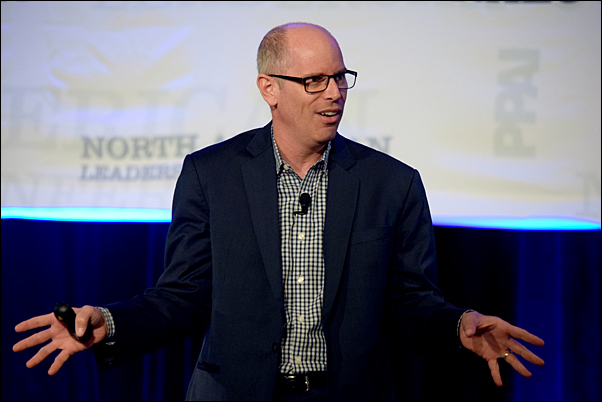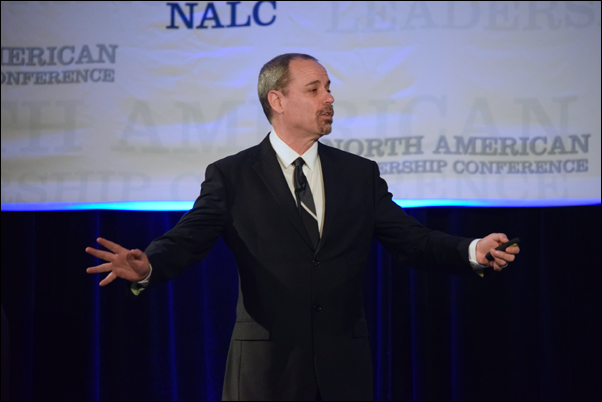
Eric McDermott, managing partner of Pacific Advisors, and former owner of Bonzolio, a distributor which serviced the financial services industry, discussed 10 principles of economics.
The speaker lineup for this week’s North American Leadership Conference in San Francisco reads like a who’s who of economic, innovation and disruption experts—and, just as impressively, one of these experts had a previous career as a distributor.
Eric McDermott, managing partner of Pacific Advisors, a financial services firm with more than 40,000 clients and 150 financial specialists, who spoke Monday morning, could easily relate to his audience as former owner of Bonzolio, a distributor which serviced the financial services industry. Even after years away from the promotional products industry, McDermott’s enthusiasm and love for what promotional products can achieve for marketers was still very much evident as he shared information on how to more deftly compete by employing business innovation and smart enterprise marketing tactics. Among his key takeaways were the 10 principles of economics. He summed up the first four as most critical: People face tradeoffs, the cost of something is what you give up to get it, rational people think at the margin and people respond to incentives—a great reinforcement for audience members.
Next up was educator Toby E. Stuart who, among other accomplishments, is the Helzel Chair in Entrepreneurship at UC Berkley. Stuart conducted an interactive session focused on business models and innovation using popular examples such as Uber. Uber, said Stuart, portends a bizarre future. It is the fastest growing company in terms of value in industrial history, as in six years it went from zero to a $20 billion valuation. And all it is, he noted, is an app with a handful of employees. “This might be the single biggest business development in industrial history, it is such a profound change.”
Stuart guided his audience through the rapid pace of disruption, innovation and transformation and highlighted some outcomes and opportunities.
Computers more powerful than anything found on the average desk five years ago are now available for less than the price of a cup of coffee. Ubiquity and mass production have also brought down the price of sensor technology and software to almost free. There has also been a massive change in capital efficiencies. With so many tools available through open source or ‘freemium’ models, Stuart says, you can now stretch venture capital much farther. “This has created an incredible set of opportunities for business model innovation,” he notes.
When someone goes to the hardware store for a drill, Stuart asked, is it because they want a drill, or do they want a hole? Riding the innovation wave transformational technologies have put in motion, businesses are taking a new approach in formulating their customer value proposition. Stuart says, “For a lot of companies out there, the core insight is it’s not the drill, it’s the hole.”
In bringing things back around to the promotional products industry and its opportunities and challenges, Stuart shared a concept that has become somewhat of a religion in the start-up world, “Fail early and fail often.” Start-up business culture has adopted the practice of constant prototyping; iterate and make changes on customer feedback. He encouraged his audience to test the market and see how far the market is willing to go, but to always be aware of their blinders and assumptions.

Jay Samit took a look at disruptive innovation, what industry companies should look out for and how to take advantage of it.
Jay Samit, one of the world’s leading experts on disruption and innovation, has raised hundreds of millions of dollars for startups and sold companies to Fortune 500 companies, among many other accomplishments. In his presentation on Monday afternoon he left the audience with much to think about—including the most predicted disruptive innovations that will change the way industry does business over the next nine years: 3-D printing, mobile (“85 percent of the globe has access to mobile phones with billions of global connections”), cloud services, the combined forces of social, local and mobile, and the rise of a shared economy (Uber and Airbnb are examples of this $26 billion business).
“Only 57 of the original Fortune 500 companies still exist,” he stated. “Business as usual is dead. Mobile is redefining the relationship between us and the world. It’s the great equalizer.”
He also talked about the importance of data, adding that more data requires more creativity. Samit also encouraged his audience to see problems in a new light with this daily mantra: “The future can be better than the present and I have the power to make it so. Every obstacle is an opportunity in disguise.”
Watch for continued coverage of NALC in Thursday’s PPB Newslink.


